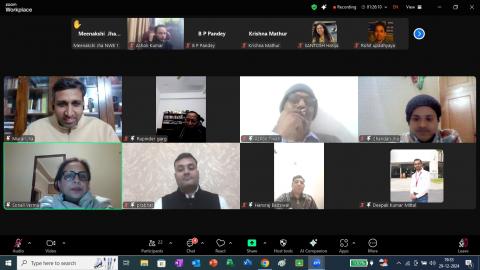
Teachers Who Read, Inspire, and Lead
In a world increasingly dominated by screens and fleeting interactions, the practice of reading offers a sanctuary for deep thought, empathy, and self-growth. This year, through the 'Read with a Teacher' program, I had the privilege of witnessing a community of educators embracing this transformative habit. Over the course of the year, teachers shared not only what they read but also their reflections on how these books shaped their thinking and teaching practices. The sheer diversity of genres they explored and their dedication to reading were nothing short of inspiring.
Reading by teachers holds immense importance. As the torchbearers of knowledge and inspiration, teachers must continually nourish their intellect to keep up with the evolving educational landscape. Reading expands their horizons, sharpens their critical thinking, and equips them with new perspectives that they can bring to their classrooms. This act of engaging with literature—from educational theory and historical accounts to philosophy and fiction—enriches their ability to connect with students and instills a culture of learning by example.
Through this program, I noticed a remarkable variety in the genres teachers chose to read. Some delved into thought-provoking classics like Paulo Freire's Pedagogy of the Oppressed and Howard Gardner's The Unschooled Mind, which enriched their understanding of education and cognitive development. Others explored philosophical works such as Thus Spoke Zarathustra by Friedrich Nietzsche and The First and Last Freedom by J. Krishnamurti, which provided fresh insights into human existence and personal growth. Books like The Psychology of Money and The Intelligent Investor underscored the importance of financial literacy, while works like The Boy, the Mole, the Fox, and the Horse and Teach Like Your Hair is on Fire offered practical wisdom and emotional resonance.
The teachers' choices were not confined to theoretical texts. Many ventured into creative fiction, poetry, and memoirs, such as Kuchh Rang The Khwabon Ke and Shekhar: Ek Jeevani, which explored human emotions and societal nuances. Books like Let My People Go Surfing and The Colours of Violence examined social issues, inspiring thought-provoking discussions. Additionally, a significant number of educators read self-help and motivational literature like The Power of the Subconscious Mind and 48 Laws of Power, which offered tools for personal and professional growth. The eclectic mix of genres demonstrated the teachers’ eagerness to learn, grow, and apply their readings to real-world contexts.
This sharing of book recommendations and reflections created a ripple effect, fostering a culture of curiosity and mutual growth within the community. Hearing about their reading journeys inspired me to curate a broader perspective on the importance of diverse literary consumption. It reinforced the idea that reading is not merely an individual activity but a communal one that thrives on shared experiences. Their enthusiasm for books like India That is Bharat and Annihilation of Caste highlighted the importance of understanding our socio-political context, while lighter reads such as Can You Teach a Zebra Some Algebra? added a touch of humor and relatability.
Looking ahead, the potential for deepening this reading culture is immense. As we step into a new year, teachers can commit to reading more by setting aside dedicated time daily or weekly, exploring digital libraries, or forming small book clubs to discuss their findings. Expanding their repertoire to include unfamiliar genres—be it graphic novels, global literature, or emerging voices—can further diversify their understanding and teaching methods. Programs like 'Read with a Teacher' can serve as platforms to not only share book recommendations but also explore collaborative writing projects, encouraging educators to document their reflections.
By cultivating this habit of reading, teachers not only enrich their minds but also set a powerful example for their students. As lifelong learners, they embody the joy and necessity of continual growth, inspiring those around them to embark on their literary journeys. Together, we can build a community where reading becomes a cornerstone of teaching and learning—a legacy that will resonate far beyond the classroom walls.
Here is the recommended list of books we received from teachers!
Antifragile by Nassim Taleb
Sophie’s World by Jostein Gaarder
Pedagogy of the Oppressed by Paulo Freire
Ideology and Curriculum by Michael Apple
The Unschooled Mind by Howard Gardner
Theories of Development
The Surrender Experiment
Thus Spoke Zarathustra
Beyond Good and Evil
Satyarth Prakash
Backbencher Teachers
Spiritual Heritage of India
The Colours of Violence
Mujhe Chand Chahiye
Love Without Spoiling, Discipline Without Nagging
Can You Teach a Zebra Some Algebra?
Mere Duniya Ke Ishwar
Games Indians Play
Teach Like Your Hair's on Fire
Let My People Go Surfing
Cleverlands
The Smartest Kids in the World and How They Got That Way
Lone Rider
My Wounded Heart
Main Aise Nahi Padhungi
Hamara Itihas, Unka Itihas, Aur Kiska Itihas
Kuchh Rang The Khwabon Ke
Sat Nadiyan Ek Samandar
Alpha Beta Gamma
Parjaat
Kit Kit
Metronama, Policenama
Duniya Ke Hone Ki Aawaz
Prem Ke Paksha Mein Prarthna
Ummeed Ka Ped
Mujhe Pehchano
Smriti Ki Rekhayen by Mahadevi Verma
Aadhunikta Aur Shiksha
On God
On Right Livelihood
The First and Last Freedom
On Education
The Psychology of Money
The Intelligent Investor
Life 3.0
The 48 Laws of Power
Why Has Nobody Told Me This Before?
The Hidden Hindus
Jeena Sikha Diya
Shekhar: Ek Jeevani
Shiksha Ke Saat Mithak
Manav Ke Saat Rang
An Inclusive Academy
The Pleasures of Reading
The Boy, the Mole, the Fox, and the Horse
Annihilation of Caste
The Power of the Subconscious Mind
Ek Desh, 12 Duniya
Media Ka Loktantra
Radio Koshi
Professor Ki Diary
No Man is an Island
The Cooking of Books
Thank You, Gandhi
India That is Bharat
- Log in to post comments
